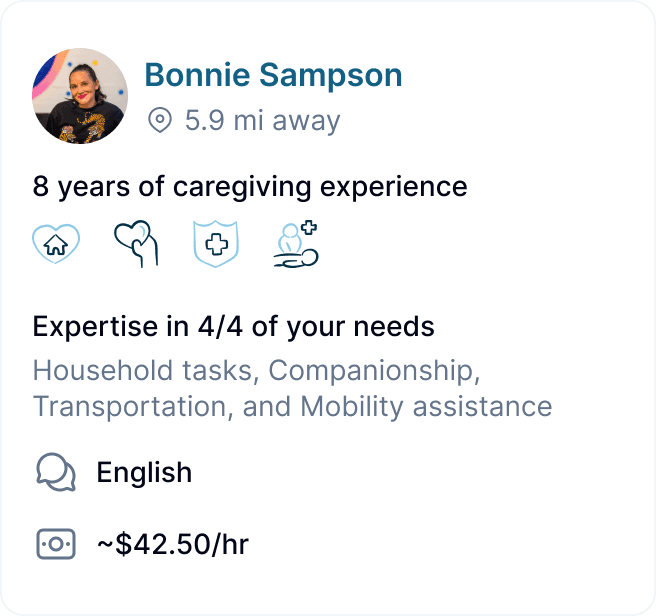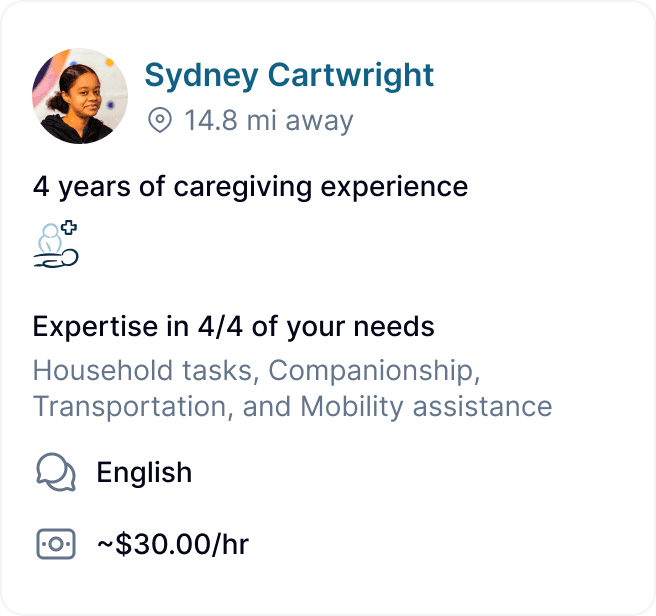What Are The Activities Of Daily Living (ADLs)?



Activities of Daily Living (ADLs) are fundamental self-care tasks that individuals perform daily to maintain their health, hygiene, and independence. For seniors, the ability to carry out these activities often determines their level of independence and whether they require additional support, such as home care.
Understanding ADLs is crucial for families and caregivers to provide appropriate assistance and ensure the well-being of their elderly loved ones.
What Are Activities of Daily Living?
Activities of Daily Living refer to the basic routine tasks essential for everyday functioning. These tasks are typically manageable by healthy individuals without assistance but may become challenging for seniors due to aging, illness, or disability. ADLs are commonly divided into several core categories:
Bathing and Personal Hygiene: This includes washing the body, grooming, oral care, and maintaining general cleanliness.
Dressing: Selecting appropriate clothing and putting it on.
Toileting: Getting to and from the toilet, controlling bladder and bowel functions, and cleaning oneself afterward.
Eating: The ability to feed oneself, including using utensils.
Mobility and Transfers: Moving around the home, walking, and transferring from bed to chair or standing up.
These tasks are the foundation of self-care and independence. When seniors begin to struggle with one or more ADLs, it often signals a need for additional support to maintain their quality of life.
Why Are ADLs Important in Senior Care?
The ability to perform ADLs independently is a key indicator of a senior’s functional status and overall health. Declining ability in these areas can result from chronic conditions, cognitive impairments like dementia, or physical injuries such as strokes or falls. When ADLs become difficult, seniors may face risks such as poor hygiene, malnutrition, falls, and social isolation.
Assessing ADLs helps caregivers and healthcare professionals determine the level of care a senior needs. For example, if a senior requires help with bathing, dressing, or mobility, home care services can provide personalized assistance while allowing them to remain in the comfort of their own home.
Instrumental Activities of Daily Living (IADLs)
In addition to basic ADLs, there are Instrumental Activities of Daily Living (IADLs), which are more complex tasks necessary for independent living but not required every day. These include:
Meal planning and preparation
Shopping for groceries and essentials
Managing medications
Housekeeping and laundry
Managing finances and paying bills
Using transportation and communication devices
IADLs require higher cognitive and organizational skills. A decline in IADL abilities often precedes difficulties with basic ADLs and can be an early sign that a senior needs support.
How Home Care Supports Seniors with ADLs
Home care services play a vital role in assisting seniors with both ADLs and IADLs, helping them maintain independence and quality of life in their own homes (see more about why that's important here). Caregivers trained in senior care provide respectful, compassionate help tailored to each individual’s needs. Examples of home care support include:
Assisting with bathing, dressing, grooming, and toileting to ensure hygiene and dignity.
Helping with mobility and transfers to prevent falls and injuries.
Preparing nutritious meals and assisting with feeding if necessary.
Managing medications and ensuring timely intake.
Providing companionship and facilitating social activities to reduce isolation.
Assisting with household tasks such as cleaning, laundry, and shopping to maintain a safe and comfortable living environment.
This personalized care approach allows seniors to age in place safely while receiving the support they need to manage daily tasks.
Clara: Supporting Independence at Home
Understanding that each senior’s needs are unique, Clara offers customized care plans that focus on promoting independence and dignity.
With Clara’s professional caregivers, seniors can receive help with bathing, dressing, toileting, mobility, and meal preparation right in their homes. This support not only improves physical health but also offers emotional comfort by allowing seniors to stay connected to their familiar surroundings and routines.
Moreover, Clara’s caregivers assist with instrumental activities like medication management and household chores, ensuring a holistic approach to senior care. Families can have peace of mind knowing their loved ones are supported by trusted professionals who respect their privacy and preferences.
Thinking about home care? Get in touch with Clara on 415-985-0926 or fill in our quick, online survey to explore how we can help.
Activities of Daily Living (ADLs) are fundamental self-care tasks that individuals perform daily to maintain their health, hygiene, and independence. For seniors, the ability to carry out these activities often determines their level of independence and whether they require additional support, such as home care.
Understanding ADLs is crucial for families and caregivers to provide appropriate assistance and ensure the well-being of their elderly loved ones.
What Are Activities of Daily Living?
Activities of Daily Living refer to the basic routine tasks essential for everyday functioning. These tasks are typically manageable by healthy individuals without assistance but may become challenging for seniors due to aging, illness, or disability. ADLs are commonly divided into several core categories:
Bathing and Personal Hygiene: This includes washing the body, grooming, oral care, and maintaining general cleanliness.
Dressing: Selecting appropriate clothing and putting it on.
Toileting: Getting to and from the toilet, controlling bladder and bowel functions, and cleaning oneself afterward.
Eating: The ability to feed oneself, including using utensils.
Mobility and Transfers: Moving around the home, walking, and transferring from bed to chair or standing up.
These tasks are the foundation of self-care and independence. When seniors begin to struggle with one or more ADLs, it often signals a need for additional support to maintain their quality of life.
Why Are ADLs Important in Senior Care?
The ability to perform ADLs independently is a key indicator of a senior’s functional status and overall health. Declining ability in these areas can result from chronic conditions, cognitive impairments like dementia, or physical injuries such as strokes or falls. When ADLs become difficult, seniors may face risks such as poor hygiene, malnutrition, falls, and social isolation.
Assessing ADLs helps caregivers and healthcare professionals determine the level of care a senior needs. For example, if a senior requires help with bathing, dressing, or mobility, home care services can provide personalized assistance while allowing them to remain in the comfort of their own home.
Instrumental Activities of Daily Living (IADLs)
In addition to basic ADLs, there are Instrumental Activities of Daily Living (IADLs), which are more complex tasks necessary for independent living but not required every day. These include:
Meal planning and preparation
Shopping for groceries and essentials
Managing medications
Housekeeping and laundry
Managing finances and paying bills
Using transportation and communication devices
IADLs require higher cognitive and organizational skills. A decline in IADL abilities often precedes difficulties with basic ADLs and can be an early sign that a senior needs support.
How Home Care Supports Seniors with ADLs
Home care services play a vital role in assisting seniors with both ADLs and IADLs, helping them maintain independence and quality of life in their own homes (see more about why that's important here). Caregivers trained in senior care provide respectful, compassionate help tailored to each individual’s needs. Examples of home care support include:
Assisting with bathing, dressing, grooming, and toileting to ensure hygiene and dignity.
Helping with mobility and transfers to prevent falls and injuries.
Preparing nutritious meals and assisting with feeding if necessary.
Managing medications and ensuring timely intake.
Providing companionship and facilitating social activities to reduce isolation.
Assisting with household tasks such as cleaning, laundry, and shopping to maintain a safe and comfortable living environment.
This personalized care approach allows seniors to age in place safely while receiving the support they need to manage daily tasks.
Clara: Supporting Independence at Home
Understanding that each senior’s needs are unique, Clara offers customized care plans that focus on promoting independence and dignity.
With Clara’s professional caregivers, seniors can receive help with bathing, dressing, toileting, mobility, and meal preparation right in their homes. This support not only improves physical health but also offers emotional comfort by allowing seniors to stay connected to their familiar surroundings and routines.
Moreover, Clara’s caregivers assist with instrumental activities like medication management and household chores, ensuring a holistic approach to senior care. Families can have peace of mind knowing their loved ones are supported by trusted professionals who respect their privacy and preferences.
Thinking about home care? Get in touch with Clara on 415-985-0926 or fill in our quick, online survey to explore how we can help.
Activities of Daily Living (ADLs) are fundamental self-care tasks that individuals perform daily to maintain their health, hygiene, and independence. For seniors, the ability to carry out these activities often determines their level of independence and whether they require additional support, such as home care.
Understanding ADLs is crucial for families and caregivers to provide appropriate assistance and ensure the well-being of their elderly loved ones.
What Are Activities of Daily Living?
Activities of Daily Living refer to the basic routine tasks essential for everyday functioning. These tasks are typically manageable by healthy individuals without assistance but may become challenging for seniors due to aging, illness, or disability. ADLs are commonly divided into several core categories:
Bathing and Personal Hygiene: This includes washing the body, grooming, oral care, and maintaining general cleanliness.
Dressing: Selecting appropriate clothing and putting it on.
Toileting: Getting to and from the toilet, controlling bladder and bowel functions, and cleaning oneself afterward.
Eating: The ability to feed oneself, including using utensils.
Mobility and Transfers: Moving around the home, walking, and transferring from bed to chair or standing up.
These tasks are the foundation of self-care and independence. When seniors begin to struggle with one or more ADLs, it often signals a need for additional support to maintain their quality of life.
Why Are ADLs Important in Senior Care?
The ability to perform ADLs independently is a key indicator of a senior’s functional status and overall health. Declining ability in these areas can result from chronic conditions, cognitive impairments like dementia, or physical injuries such as strokes or falls. When ADLs become difficult, seniors may face risks such as poor hygiene, malnutrition, falls, and social isolation.
Assessing ADLs helps caregivers and healthcare professionals determine the level of care a senior needs. For example, if a senior requires help with bathing, dressing, or mobility, home care services can provide personalized assistance while allowing them to remain in the comfort of their own home.
Instrumental Activities of Daily Living (IADLs)
In addition to basic ADLs, there are Instrumental Activities of Daily Living (IADLs), which are more complex tasks necessary for independent living but not required every day. These include:
Meal planning and preparation
Shopping for groceries and essentials
Managing medications
Housekeeping and laundry
Managing finances and paying bills
Using transportation and communication devices
IADLs require higher cognitive and organizational skills. A decline in IADL abilities often precedes difficulties with basic ADLs and can be an early sign that a senior needs support.
How Home Care Supports Seniors with ADLs
Home care services play a vital role in assisting seniors with both ADLs and IADLs, helping them maintain independence and quality of life in their own homes (see more about why that's important here). Caregivers trained in senior care provide respectful, compassionate help tailored to each individual’s needs. Examples of home care support include:
Assisting with bathing, dressing, grooming, and toileting to ensure hygiene and dignity.
Helping with mobility and transfers to prevent falls and injuries.
Preparing nutritious meals and assisting with feeding if necessary.
Managing medications and ensuring timely intake.
Providing companionship and facilitating social activities to reduce isolation.
Assisting with household tasks such as cleaning, laundry, and shopping to maintain a safe and comfortable living environment.
This personalized care approach allows seniors to age in place safely while receiving the support they need to manage daily tasks.
Clara: Supporting Independence at Home
Understanding that each senior’s needs are unique, Clara offers customized care plans that focus on promoting independence and dignity.
With Clara’s professional caregivers, seniors can receive help with bathing, dressing, toileting, mobility, and meal preparation right in their homes. This support not only improves physical health but also offers emotional comfort by allowing seniors to stay connected to their familiar surroundings and routines.
Moreover, Clara’s caregivers assist with instrumental activities like medication management and household chores, ensuring a holistic approach to senior care. Families can have peace of mind knowing their loved ones are supported by trusted professionals who respect their privacy and preferences.
Thinking about home care? Get in touch with Clara on 415-985-0926 or fill in our quick, online survey to explore how we can help.
More about senior health
More about senior health


Strong, Steady, and Supported: Helping Seniors Stay Active and Empowered



Clara Editorial Team


How Aging in Place Supports Mental Health for Seniors



Lowrie Hilladakis


How Therapy Animals Can Help with Loneliness in Seniors



Clara Editorial Team


This Is Ageist: When Seniors Feel Dismissed by the System



Clara Editorial Team


Peace of Mind: How Meditation Supports Seniors and Their Caregivers



Lowrie Hilladakis


Osteoporosis in Older Adults: What Every Caregiver Should Know



Clara Editorial Team


Why Aging in Place Is the New Reality for Most Baby Boomers



Clara Editorial Team


Warning Signs Of Vision Loss In Seniors—And What To Do Next



Clara Editorial Team


“They Were Talking to Each Other, But Not to Me”: Understanding the Patient Experience During Hospital-to-SNF Transitions



Clara Editorial Team


Talking About Therapy: How to Normalize Mental Health Support with Aging Parents



Lowrie Hilladakis
GEt started for free
Better care starts with Clara.
Find, hire, and pay top-notch caregivers without the headache for a price that fits your budget.



GEt started for free
Better care starts with Clara.
Find, hire, and pay top-notch caregivers without the headache for a price that fits your budget.



GEt started for free
Better care starts with Clara.
Find, hire, and pay top-notch caregivers without the headache for a price that fits your budget.

